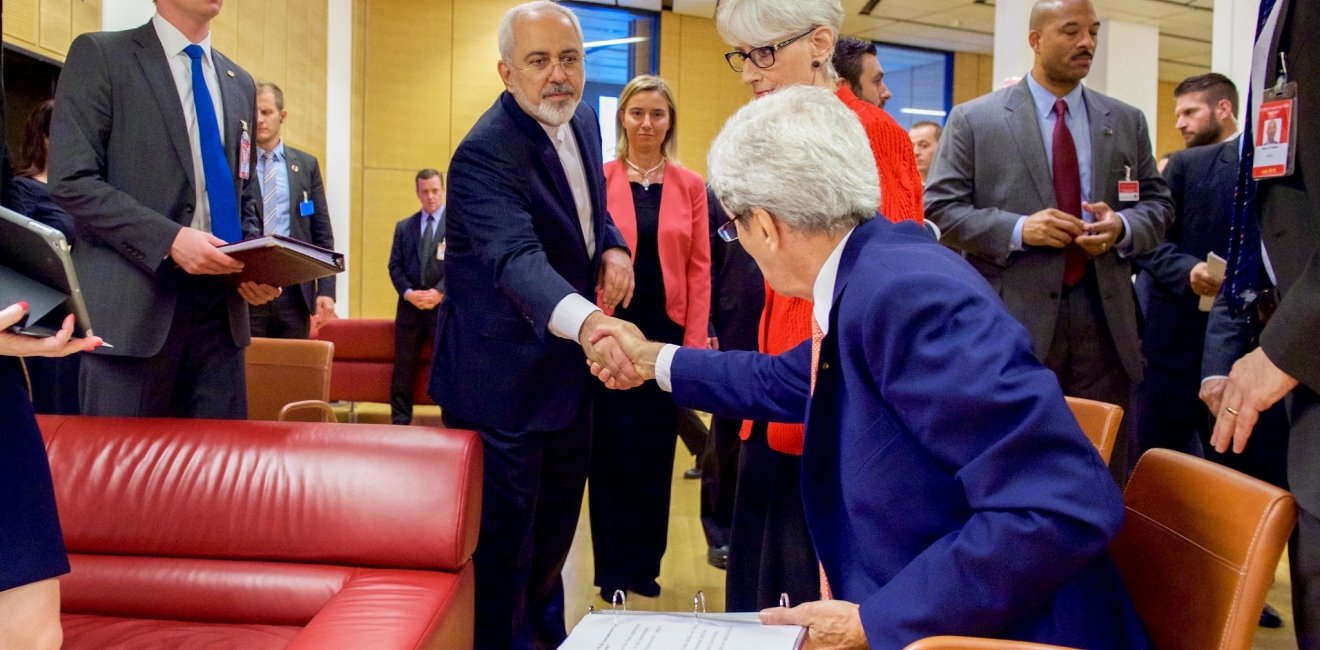In Washington and Tehran, Debate and Distrust Over Nuclear Deal
This is not the first time hard-liners in Washington and Tehran have had parallel contretemps. Find out why.
This is not the first time hard-liners in Washington and Tehran have had parallel contretemps. Find out why.

In his speech last week at American University defending the accord, President Barack Obama equated Republican critics of the agreement with Iranian hard-liners implacably opposed to rapprochement, let alone a deal with the “Great Satan.” Mr. Obamadefended his comments in a CNN interview, pushing back against charges of “crass political rhetoric” and singling out Iran’s Revolutionary Guard Corps, the Qods Force, and others who are more satisfied with preserving the status quo.
Congressional naysayers –have offered a variety of arguments against the deal. Among them: that the U.S. caved during negotiations, violating its own “red lines“; that sanctions relief will provide Iran with a cash bonanza enabling the Islamic Republic to maintain and even expand its regional machinations; that the dealincreases the chances of conflict; and that “Iran has cheated on every agreement they’ve signed” and can’t be trusted.
Meanwhile in Tehran, Ayatollah Ahmad Alam-ol-Hoda, the Mashhad Friday prayer leader and a member of the body that will anoint the next supreme leader, said that “although the negotiating team put a lot of effort into reaching this deal, unfortunately the agreement violates the redlines that the Supreme Leader has specified.” Mohammad Ali Jafari, head of the Revolutionary Guards, went further, denouncing a draft of the U.N. Security Council resolution supporting the agreement asunduly limiting Iran’s defensive capabilities. The supreme leader signaled in May that Iran would continue intervening in regional affairs, proclaiming that “Yemen, Bahrain, and Palestine are oppressed, and we protect oppressed people as much as we can.”
The conservative newspaper Kayhan, known to be close to the supreme leader, editorialized on July 9 that the“nuclear agreement would not decrease the likelihood of war and confrontation, but rather function in the opposite direction” and would “fill out the voids in the American intelligence puzzle and guarantee the success of a [military] attack.” And as one of us noted on Think Tank last month, former president Mahmoud Ahmadinejad expressed opposition by posting a hadith from Imam Ali on his Instagram account: “be deeply afraid of your enemy when s/he reaches out to you in peace and compromise, because your enemy approaches you under the cover of peace to catch you off guard. So exercise vigilance and care, and do not be credulous and optimistic in such circumstances.”
This is not the first time hard-liners in Washington and Tehran have had parallel contretemps. After the Iran Nuclear Agreement Review Act passed in May, formalizing a role in the debate for the U.S. Congress, Iran’s conservative-dominated parliament approved legislation affirming its own role and laying out conditions, among them immediate sanctions relief on the day a deal takes effect and limits on inspections. Then it formed a committee to analyze the deal, planning to wait at least 80 days to issue its final verdict—well after the U.S. Congress votes up or down on the agreement.
In both capitals, accusations are swirling about capitulation, weaponization, hegemony, conflict, and deceit. There is a big difference in Iranian politics, though. If and when Iran’s supreme leader endorses the deal, everyone will toe the line. And optimism among ordinary Iranians that a deal is at hand is too high for opponents to sabotage the accord. If Congress votes against the agreement, Iranians will blame the U.S. for the failure, particularly as the other countries that negotiated the deal have endorsed it.
Haleh Esfandiari is director emerita of and a senior scholar at the Middle East program at the Woodrow Wilson International Center for Scholars. She was held in solitary confinement in Evin Prison in Tehran for 105 days in 2007. The views expressed here are her own. Jason Brodsky is a research associate in the Wilson Center’s Middle East Program.
This article was originally published on The Wall Street Journal's Washington Wire.



The Wilson Center’s Middle East Program serves as a crucial resource for the policymaking community and beyond, providing analyses and research that helps inform US foreign policymaking, stimulates public debate, and expands knowledge about issues in the wider Middle East and North Africa (MENA) region. Read more


